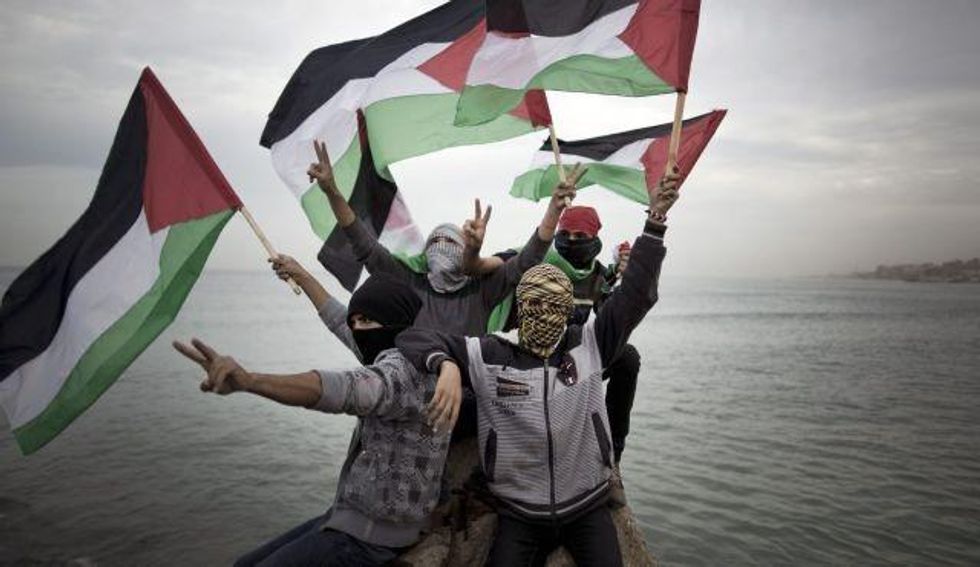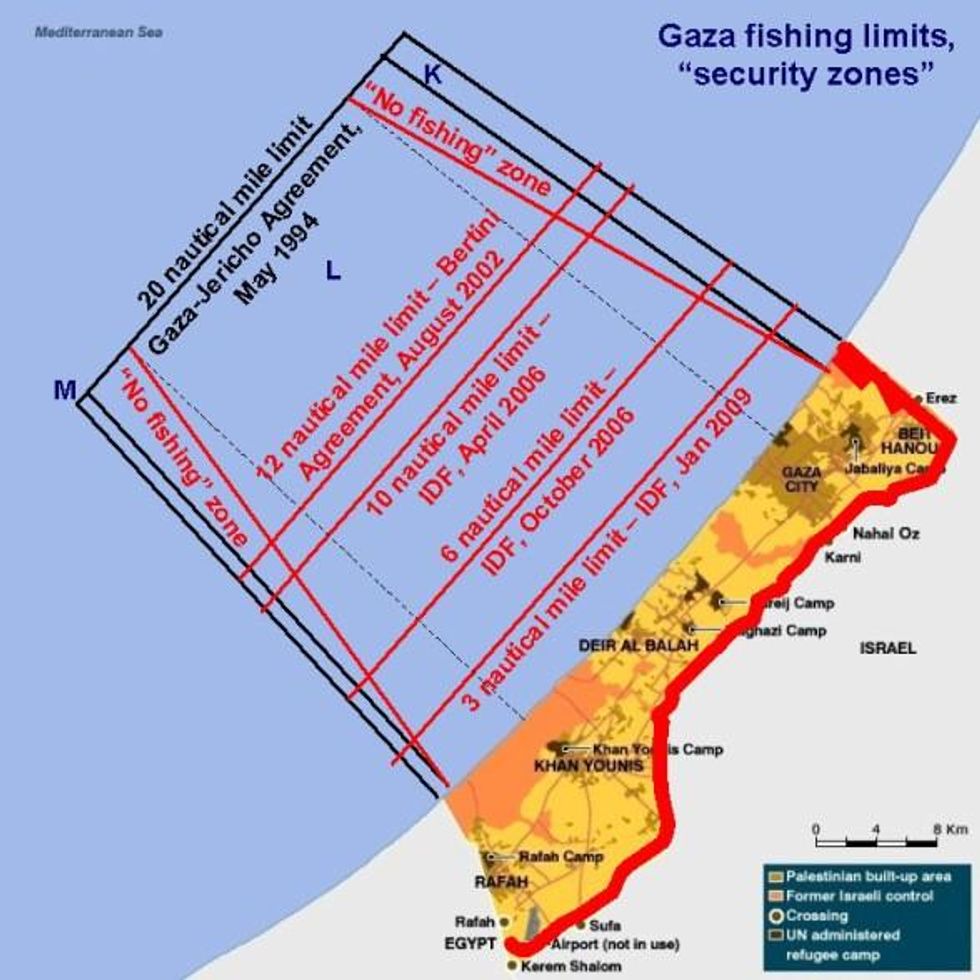

SUBSCRIBE TO OUR FREE NEWSLETTER
Daily news & progressive opinion—funded by the people, not the corporations—delivered straight to your inbox.
5
#000000
#FFFFFF
To donate by check, phone, or other method, see our More Ways to Give page.


Daily news & progressive opinion—funded by the people, not the corporations—delivered straight to your inbox.

Protesters say the blockade--which restricts Gazans from traveling more than six miles from shore--stifles the local fishing industry and adds to the food crisis and resource shortage in Gaza which stems from the Israeli-imposed blockade and militarization of Gaza's borders.
The protesters were demonstrating "to put pressure on Israel to stop its violation against the fishermen" and "against the illegal blockade and against the illegal occupation," Majed Abusalama, spokesman for the protest organizing Gaza-based Intifada Youth Coalition told The Jerusalem Post.
The group said 200 people took part in the "reverse flotilla" which set off from Gaza City where a portion of the boats crossed the six-mile maritime boarder, which is enforced by Israeli Defense Forces, before returning to shore.

"[We] want to say to everyone that enough is enough," Abusalama said.
As Reuters reports, "Israeli forces have regularly shot at Gaza boats seen as trying to breach the blockade," although no reports of gunfire surfaced Monday.
"We have sent a message of solidarity with the fishermen and a message to the world that they must act to end the Gaza blockade," said Shorouq Mahmoud of the Intifada Youth Coalition.
Last month the Outgoing Commissioner General of United Nations Relief and Works Agency for Palestine Refugees in the Near East (UNRWA), Filippo Grandi, said Gaza has become "uninhabitable," due to the ongoing land and naval blockade which has vastly restricted access to food, water, building and medical supplies, and other basic necessities.
On Twitter:
_____________________
Dear Common Dreams reader, The U.S. is on a fast track to authoritarianism like nothing I've ever seen. Meanwhile, corporate news outlets are utterly capitulating to Trump, twisting their coverage to avoid drawing his ire while lining up to stuff cash in his pockets. That's why I believe that Common Dreams is doing the best and most consequential reporting that we've ever done. Our small but mighty team is a progressive reporting powerhouse, covering the news every day that the corporate media never will. Our mission has always been simple: To inform. To inspire. And to ignite change for the common good. Now here's the key piece that I want all our readers to understand: None of this would be possible without your financial support. That's not just some fundraising cliche. It's the absolute and literal truth. We don't accept corporate advertising and never will. We don't have a paywall because we don't think people should be blocked from critical news based on their ability to pay. Everything we do is funded by the donations of readers like you. Will you donate now to help power the nonprofit, independent reporting of Common Dreams? Thank you for being a vital member of our community. Together, we can keep independent journalism alive when it’s needed most. - Craig Brown, Co-founder |

Protesters say the blockade--which restricts Gazans from traveling more than six miles from shore--stifles the local fishing industry and adds to the food crisis and resource shortage in Gaza which stems from the Israeli-imposed blockade and militarization of Gaza's borders.
The protesters were demonstrating "to put pressure on Israel to stop its violation against the fishermen" and "against the illegal blockade and against the illegal occupation," Majed Abusalama, spokesman for the protest organizing Gaza-based Intifada Youth Coalition told The Jerusalem Post.
The group said 200 people took part in the "reverse flotilla" which set off from Gaza City where a portion of the boats crossed the six-mile maritime boarder, which is enforced by Israeli Defense Forces, before returning to shore.

"[We] want to say to everyone that enough is enough," Abusalama said.
As Reuters reports, "Israeli forces have regularly shot at Gaza boats seen as trying to breach the blockade," although no reports of gunfire surfaced Monday.
"We have sent a message of solidarity with the fishermen and a message to the world that they must act to end the Gaza blockade," said Shorouq Mahmoud of the Intifada Youth Coalition.
Last month the Outgoing Commissioner General of United Nations Relief and Works Agency for Palestine Refugees in the Near East (UNRWA), Filippo Grandi, said Gaza has become "uninhabitable," due to the ongoing land and naval blockade which has vastly restricted access to food, water, building and medical supplies, and other basic necessities.
On Twitter:
_____________________

Protesters say the blockade--which restricts Gazans from traveling more than six miles from shore--stifles the local fishing industry and adds to the food crisis and resource shortage in Gaza which stems from the Israeli-imposed blockade and militarization of Gaza's borders.
The protesters were demonstrating "to put pressure on Israel to stop its violation against the fishermen" and "against the illegal blockade and against the illegal occupation," Majed Abusalama, spokesman for the protest organizing Gaza-based Intifada Youth Coalition told The Jerusalem Post.
The group said 200 people took part in the "reverse flotilla" which set off from Gaza City where a portion of the boats crossed the six-mile maritime boarder, which is enforced by Israeli Defense Forces, before returning to shore.

"[We] want to say to everyone that enough is enough," Abusalama said.
As Reuters reports, "Israeli forces have regularly shot at Gaza boats seen as trying to breach the blockade," although no reports of gunfire surfaced Monday.
"We have sent a message of solidarity with the fishermen and a message to the world that they must act to end the Gaza blockade," said Shorouq Mahmoud of the Intifada Youth Coalition.
Last month the Outgoing Commissioner General of United Nations Relief and Works Agency for Palestine Refugees in the Near East (UNRWA), Filippo Grandi, said Gaza has become "uninhabitable," due to the ongoing land and naval blockade which has vastly restricted access to food, water, building and medical supplies, and other basic necessities.
On Twitter:
_____________________